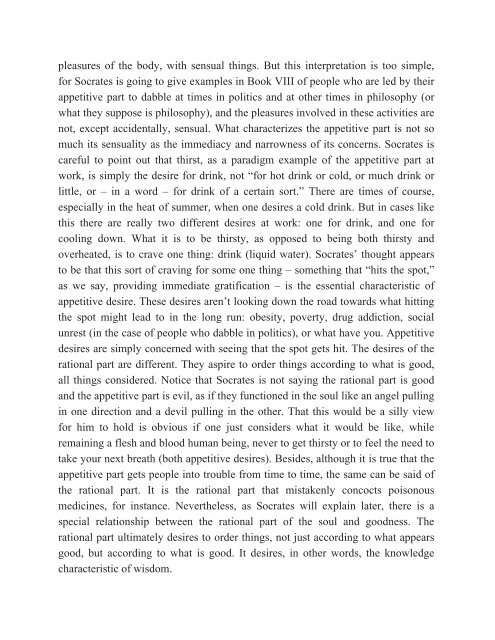The Intelligent Troglodyte’s Guide to Plato’s Republic, 2016a
The Intelligent Troglodyte’s Guide to Plato’s Republic, 2016a
The Intelligent Troglodyte’s Guide to Plato’s Republic, 2016a
You also want an ePaper? Increase the reach of your titles
YUMPU automatically turns print PDFs into web optimized ePapers that Google loves.
pleasures of the body, with sensual things. But this interpretation is <strong>to</strong>o simple,<br />
for Socrates is going <strong>to</strong> give examples in Book VIII of people who are led by their<br />
appetitive part <strong>to</strong> dabble at times in politics and at other times in philosophy (or<br />
what they suppose is philosophy), and the pleasures involved in these activities are<br />
not, except accidentally, sensual. What characterizes the appetitive part is not so<br />
much its sensuality as the immediacy and narrowness of its concerns. Socrates is<br />
careful <strong>to</strong> point out that thirst, as a paradigm example of the appetitive part at<br />
work, is simply the desire for drink, not “for hot drink or cold, or much drink or<br />
little, or – in a word – for drink of a certain sort.” <strong>The</strong>re are times of course,<br />
especially in the heat of summer, when one desires a cold drink. But in cases like<br />
this there are really two different desires at work: one for drink, and one for<br />
cooling down. What it is <strong>to</strong> be thirsty, as opposed <strong>to</strong> being both thirsty and<br />
overheated, is <strong>to</strong> crave one thing: drink (liquid water). Socrates’ thought appears<br />
<strong>to</strong> be that this sort of craving for some one thing – something that “hits the spot,”<br />
as we say, providing immediate gratification – is the essential characteristic of<br />
appetitive desire. <strong>The</strong>se desires aren’t looking down the road <strong>to</strong>wards what hitting<br />
the spot might lead <strong>to</strong> in the long run: obesity, poverty, drug addiction, social<br />
unrest (in the case of people who dabble in politics), or what have you. Appetitive<br />
desires are simply concerned with seeing that the spot gets hit. <strong>The</strong> desires of the<br />
rational part are different. <strong>The</strong>y aspire <strong>to</strong> order things according <strong>to</strong> what is good,<br />
all things considered. Notice that Socrates is not saying the rational part is good<br />
and the appetitive part is evil, as if they functioned in the soul like an angel pulling<br />
in one direction and a devil pulling in the other. That this would be a silly view<br />
for him <strong>to</strong> hold is obvious if one just considers what it would be like, while<br />
remaining a flesh and blood human being, never <strong>to</strong> get thirsty or <strong>to</strong> feel the need <strong>to</strong><br />
take your next breath (both appetitive desires). Besides, although it is true that the<br />
appetitive part gets people in<strong>to</strong> trouble from time <strong>to</strong> time, the same can be said of<br />
the rational part. It is the rational part that mistakenly concocts poisonous<br />
medicines, for instance. Nevertheless, as Socrates will explain later, there is a<br />
special relationship between the rational part of the soul and goodness. <strong>The</strong><br />
rational part ultimately desires <strong>to</strong> order things, not just according <strong>to</strong> what appears<br />
good, but according <strong>to</strong> what is good. It desires, in other words, the knowledge<br />
characteristic of wisdom.


















